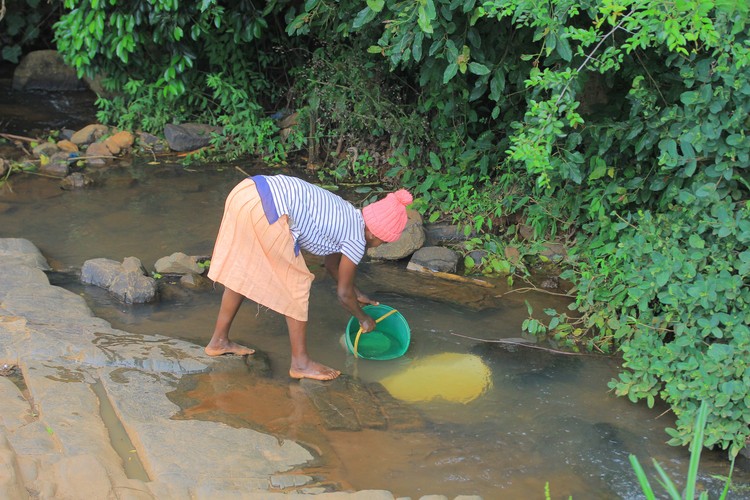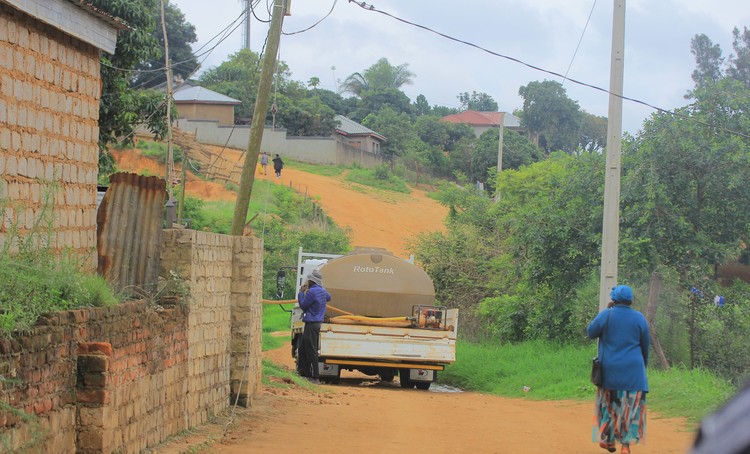Fewer than half of Elim’s boreholes work and municipal water tankers are a rare sight
Private water sellers are filling the gap, but the municipality says they are acting against the law
Without access to a reliable supply of clean drinking water, many residents collect untreated river water. Photos: Thembi Siaga
- With only 45 out of 109 boreholes working in Elim and the surrounding villages, residents almost never have access to clean drinking water.
- A multi-million-rand bulk water project for the area has stalled, and the municipality’s tankers seldom deliver water.
- Some residents with private boreholes have started selling water, charging up to R350 to refill a water tank.
- The Vhembe District Municipality says selling water from private boreholes is against the law.
Fewer than half of the municipal boreholes in Elim and its surrounding villages are operational.
According to a document provided by the Vhembe District Municipality, only 45 out of 109 boreholes were working in October.
Without reliable access to clean drinking water, residents rely on untreated water from the Magugule River and water from private vendors.
The municipality’s tankers, meant to deliver free water to villages, rarely arrive. Some residents said it has been six months since their last water delivery. Private vendors are filling the gap, driving around the area with water tankers and selling water from private boreholes. Households pay R2 per 20-litre container and up to R350 to fill their water tanks.
A R215-million bulk water project for Elim and other areas was initially planned to be completed by June 2025, but it has still not started. Funds have still not been secured, said municipal spokesperson Moses Shibambu.
We visited five villages where the boreholes were not working. At two villages, residents reported receiving some water – only on Saturdays and for a few hours at a time. In the remaining villages, there is no water.
At Mabendengwa village, for example, the only borehole has been broken for years. Villagers walk to a nearby spring to wash their clothes. At Tshuhari village, residents say the borehole has not worked since May.
Not far away, in Vari village, 64-year-old pensioner Thiathu Sinwamali lives just a few metres from a large reservoir that has stood empty since 2012 because a borehole has still not been repaired.
“The last time we received water was around 2012,” she said. “We are suffering. Grants aren’t enough for both food and water, and we still have to pay for funeral policies. We feel neglected.”
Repeated pleas to the municipality for water restoration have brought little change, said Mishark Mabobo, chairperson of Tshuhari Pastoral Village. “Elim as a whole feels forgotten … After five years in power, there’s been no visible service delivery,” he said.
A private water tanker refills a resident’s tank, charging R350.
A water seller from Elim, Dumisani Mugari, said he began selling water in 2017. “I source water from my home borehole. I applied for a licence last year, but it’s still taking time,” he said.
In Vari village, one homeowner has connected her private borehole to nearby households with long pipes, charging R250 per tank refill.
The sale of water for profit requires municipal authorisation in line with national legislation, says municipal spokesperson Shibambu. This includes water from private boreholes. The municipality is working with law enforcement and is working to disconnect illegal connections.
Shibambu said while the bulk water project remains planned, more boreholes are being drilled as a temporary measure. Artisans will be appointed to repair non-functional boreholes, he said.
Published with the Limpopo Mirror
Support independent journalism
Donate using Payfast

Don't miss out on the latest news
We respect your privacy, and promise we won't spam you.
Next: EThekwini blames Shembe Church for delays in housing project
Previous: State must stop xenophobic vigilantism at clinics, court told
© 2025 GroundUp. This article is licensed under a Creative Commons Attribution-NoDerivatives 4.0 International License.
You may republish this article, so long as you credit the authors and GroundUp, and do not change the text. Please include a link back to the original article.
We put an invisible pixel in the article so that we can count traffic to republishers. All analytics tools are solely on our servers. We do not give our logs to any third party. Logs are deleted after two weeks. We do not use any IP address identifying information except to count regional traffic. We are solely interested in counting hits, not tracking users. If you republish, please do not delete the invisible pixel.


